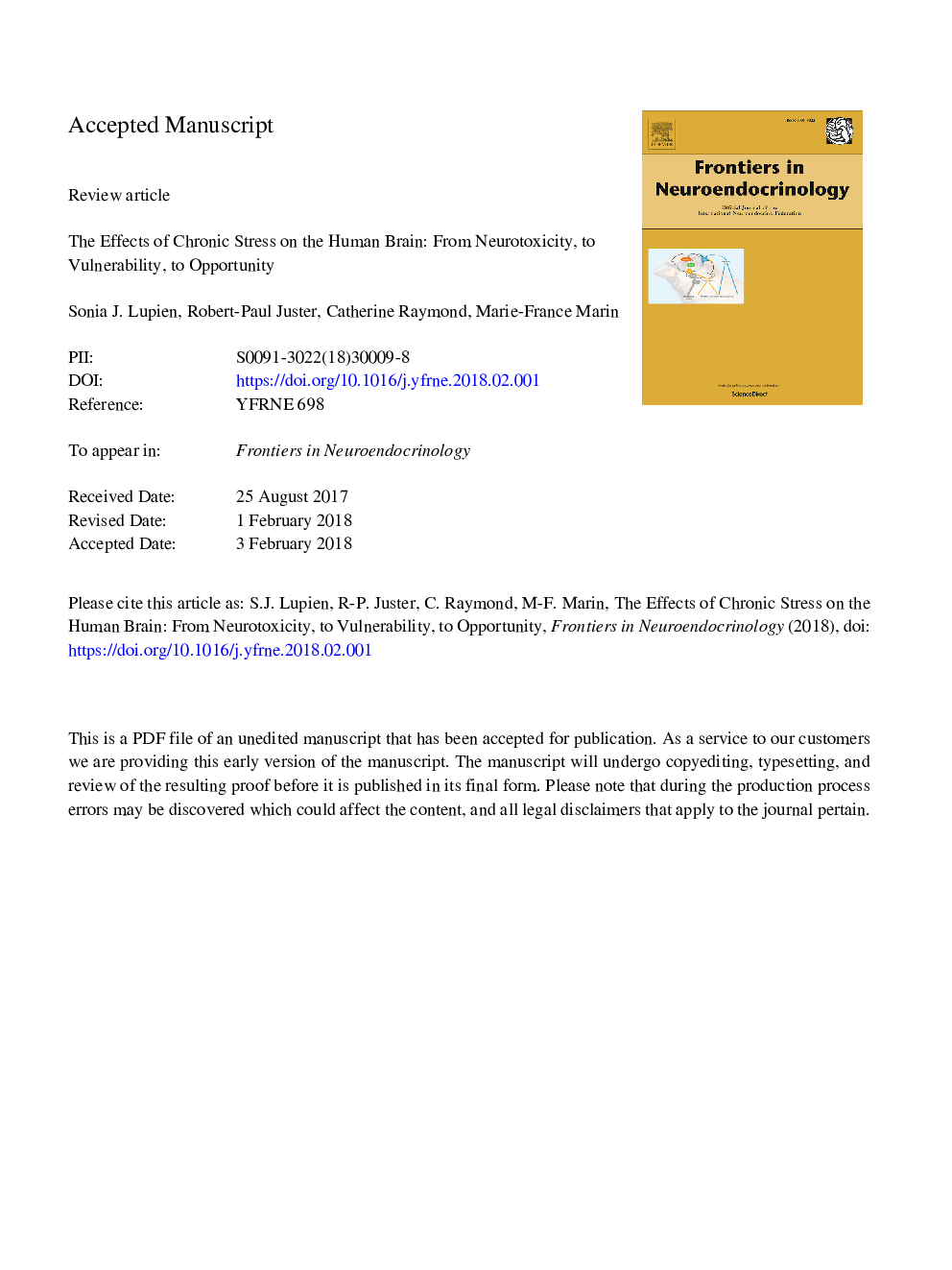| کد مقاله | کد نشریه | سال انتشار | مقاله انگلیسی | نسخه تمام متن |
|---|---|---|---|---|
| 8630530 | 1568814 | 2018 | 61 صفحه PDF | دانلود رایگان |
عنوان انگلیسی مقاله ISI
The effects of chronic stress on the human brain: From neurotoxicity, to vulnerability, to opportunity
ترجمه فارسی عنوان
اثرات استرس مزمن بر مغز انسان: از عصبی، به آسیب پذیری، به فرصت
دانلود مقاله + سفارش ترجمه
دانلود مقاله ISI انگلیسی
رایگان برای ایرانیان
کلمات کلیدی
ترجمه چکیده
در پنج دهه گذشته، علم توانسته است مکانیزمی را تعیین کند که هورمون استرس میتواند بر مغز انسان تأثیر بگذارد. گیرنده های گلوکوکورتیکوئیدی در هیپوکامپ، آمیگدال و قشر جلویی، سه مغز درگیر در پردازش حافظه و تنظیم عاطفی یافت می شوند. مطالعات نشان داده است که در معرض استرس مزمن با کاهش حجم هیپوکامپ همراه است و استرس مزمن می تواند حجم هر دو آمیگدال و قشر جلویی را مدول کند و اثرات عصبی هورمون استرس بر مغز را نشان می دهد. با این حال، مطالعات دیگر گزارش می دهند که قرار گرفتن در معرض تهدید زودرس و / یا فشارهای خانوادگی / اجتماعی می تواند آسیب پذیری را در برابر استرس در بزرگسالی افزایش دهد. اخیرا مدل ها برای توصیف نقش هایی که اثرات نوروکوکسیک و آسیب پذیری می توانند بر روی مغز در حال رشد داشته باشند، ایجاد شده است. این مدل ها نشان می دهد که مداخلات استرس زودهنگام در گذشته می تواند به طور بالقوه اثرات استرس مزمن بر مغز را کنار بگذارد و نتایج حاصل از این فرضیه خلاصه می شود.
موضوعات مرتبط
علوم زیستی و بیوفناوری
بیوشیمی، ژنتیک و زیست شناسی مولکولی
علوم غدد
چکیده انگلیسی
For the last five decades, science has managed to delineate the mechanisms by which stress hormones can impact on the human brain. Receptors for glucocorticoids are found in the hippocampus, amygdala and frontal cortex, three brain regions involved in memory processing and emotional regulation. Studies have shown that chronic exposure to stress is associated with reduced volume of the hippocampus and that chronic stress can modulate volumes of both the amygdala and frontal cortex, suggesting neurotoxic effects of stress hormones on the brain. Yet, other studies report that exposure to early adversity and/or familial/social stressors can increase vulnerability to stress in adulthood. Models have been recently developed to describe the roles that neurotoxic and vulnerability effects can have on the developing brain. These models suggest that developing early stress interventions could potentially counteract the effects of chronic stress on the brain and results going along with this hypothesis are summarized.
ناشر
Database: Elsevier - ScienceDirect (ساینس دایرکت)
Journal: Frontiers in Neuroendocrinology - Volume 49, April 2018, Pages 91-105
Journal: Frontiers in Neuroendocrinology - Volume 49, April 2018, Pages 91-105
نویسندگان
Sonia J. Lupien, Robert-Paul Juster, Catherine Raymond, Marie-France Marin,
